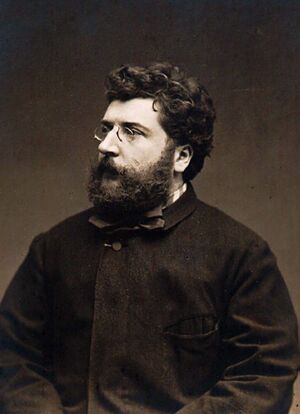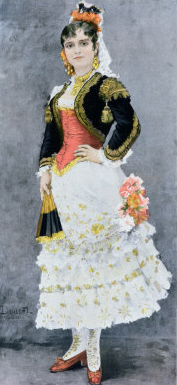Georges Bizet
French composer (b. 25 October 1838 [N.S.] in Paris; d. 3 June 1875 [N.S.] in Bougival, near Paris), born Alexandre César Léopold Bizet.
Tchaikovsky and Bizet
Tchaikovsky's admiration for Bizet and especially his masterpiece Carmen (1875) was tremendous. Already by mid-1875 he was studying the vocal-piano reduction of the opera, which had been sent to him by Vladimir Shilovsky after attending the premiere of Carmen in Paris on 3 March 1875 [N.S.] Modest Tchaikovsky later recalled the impression which the score of Carmen made on his brother: "Never before this had a work of contemporary music so captivated our composer. He was in a state of utter ecstasy over the bold and original beauties of both the libretto and the music. From this moment on, it was easy to predict that for the subject of his next opera Pyotr Ilyich would not choose a story about kings or gods or cardboard boyars, but something as close to life and as close to us as the sad story of Don Jose's love. Bizet's death, coming as it did three months to the day after the first performance of Carmen, further intensified Peter Ilyich's fascination both with the opera as such and with the talent of the prematurely deceased French master" [1]. In an article written in November 1875 about Saint-Saëns's concert tour to Russia, Tchaikovsky discussed the avant-garde circle of French composers, referring to Bizet as "an exceptionally gifted composer who died this summer when he was just 36".
On 20 January 1876 [N.S.], during a brief stay in Paris with Modest, Tchaikovsky heard Carmen for the first time at the Opéra-Comique, with Celestine Galli-Marié in the title-role. Modest later recalled: "Rarely have I seen my brother so excited by a theatre spectacle. The reason for this is that, although he was already familiar with the opera's music, it was here that he first became acquainted with the beauties of the score's orchestration, and, moreover, the astonishing interpretation of the role of Carmen by Madame Galli-Marié also had a considerable effect on his appreciation. She was not outstanding as a singer, because her vocal resources were far from first-rate, but as an actress, on the other hand, she was one of the most spellbinding talents. Carmen in her interpretation, whilst preserving all the vitality of this figure, was at the same time shrouded in the indescribable charms of burning, unbridled passion and mystic fatalism" [2]. Modest described this evening at the theatre as "one of the strongest musical impressions" of his brother's life, and noted how Tchaikovsky then and there bought himself a photograph of the late French composer, on which he wrote: "Bizet — 20/8 January 1876" [3].
In a letter to Nadezhda von Meck from San Remo at the start of 1878, Tchaikovsky reflected on how French music had been making great strides in recent years and mentioned Carmen specifically: "It is a music without pretensions to depth, but so charming in its simplicity, so lively, so sincere rather than invented, that I have almost learnt the whole opera by heart from beginning to end!" [4] While staying at Nadezhda von Meck's cottage in Simaki in June 1880, Tchaikovsky was even considering writing an article on Carmen, which he considered to be "perhaps the most outstanding operatic work of our age" [5]. In this article, which he admitted he would never actually commit to paper, but whose main ideas he presented in a remarkable letter to his benefactress, Tchaikovsky wanted to show how, unlike the great masters of the past (Mozart, Beethoven, Schubert), all modern composers were consciously striving after all kinds of fanciful orchestral and harmonic effects, but that this "purely rational process of musical invention" just led to music which was cold and lacked genuine inspiration. Then "suddenly a Frenchman [Bizet] turns up, whom I do not hesitate to call a genius, and in whom all these poignant and spicy effects are not made up, but rather pour out in a free-flowing stream, flattering the ear but at the same time also moving and affecting one […] He has given us a paragon of that element in art which can be described as prettiness — le joli. Bizet is an artist who pays tribute to the corrupted tastes of his age, but who is nonetheless imbued with true, genuine feeling and inspiration."
Tchaikovsky concluded his reflections on Bizet in this very same letter to Nadezhda von Meck with some truly prophetic words: "Carmen in my view is a chef d'oeuvre in the true sense of the word, that is one of those few works which are fated to reflect most intensively the musical tendencies of a whole age [...] I am convinced that within some ten years or so Carmen will be the most popular opera in the world!" [6] Five years later, writing to the singer Emiliya Pavlovskaya, who was not so enthusiastic about a forthcoming production of Carmen at the Saint Petersburg Mariinsky Theatre, he observed: "You mustn't quarrel with those who rate this opera highly. I myself am of the opinion that if any contemporary opera is fated to outlive our century, then it is precisely this opera. In its unpretentiousness this fragrant musical flower is full of astonishing beauty" [7].
Echoes of Carmen have often been discerned in Tchaikovsky's own music, starting from Symphony No. 4, and "citations" from this opera can be picked out in certain passages of his later works, such as the opening children's chorus in The Queen of Spades or in the first movement of Symphony No. 6 [8]. Tchaikovsky had the opportunity to acquaint himself with other works by Bizet as well, such as the incidental music to L'Arlésienne (1872), which he described as "enchanting" after hearing some numbers from it at a Russian Musical Society concert in Saint Petersburg [9].
Bibliography
- Рождение русской Кармен (2012)
External Links
Notes and References
- ↑ Жизнь Петра Ильича Чайковского, том 1 (1997), p. 451.
- ↑ Жизнь Петра Ильича Чайковского, том 1 (1997), p. 451-452.
- ↑ Жизнь Петра Ильича Чайковского, том 1 (1997), p. 452. This photograph is to this day preserved in the Tchaikovsky State Memorial Musical Museum-Reserve at Klin.
- ↑ Letter 705 to Nadezhda von Meck, 24 December 1877/5 January 1878.
- ↑ Letter 1541 to Modest Tchaikovsky, 18/30 June–19 June/1 July 1880.
- ↑ Letter 1539 to Nadezhda von Meck, 16/28 June–19 June/1 July 1880.
- ↑ Letter 2710 to Emiliya Pavlovskaya, 18/30 May 1885.
- ↑ For a more detailed discussion of this topic, see, for example, On Čajkovskij's psychopathology and its relationship with his creativity (1995), p. 323, where Henry Zajaczkowski refers to the analysis of the Fourth Symphony in Tchaikovsky. A biographical and critical study, vol. 2 (1982).
- ↑ See Letter 948 to Nadezhda von Meck, 24 October/5 November 1878.


